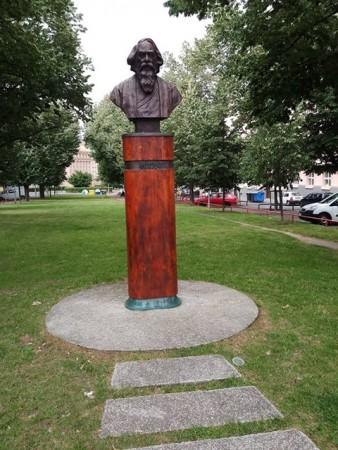
When I had heard the name for the first time, it rang a bell. "Thakurova". Is that quite a Czech name? As a Bengali, the word 'Thakur' resembled the mother tongue. It is the word for 'God' in my language. So, do the Czech people also believe in a similar god? The questions were many.
I wouldn't have cared much about it when I reached Prague to attend an international journalists' workshop. But since the organisers had made arrangements for the participants' stay at Masarykova Kolej in Thakurova that I learned more about and I cracked the puzzle just a few hours after I reached the venue. Thakurova was named after the Nobel laureate Rabindranath Tagore, aan Indian and Bengali, and I just couldn't hold back my excitement after seeing the bard's bust in Thakurova Street, which is home to Prague's Technical University.
Also read: Prague diary 2: Seeing the John Lennon Wall, a piece of living history
It was a pleasant surprise that an area in Prague has been named after Tagore though given the man's stature worldwide, it was never something sudden. In fact, the Czechs have used his actual surname 'Thakur' for naming the place and not what we call it as (Tagore). But how was the poet associated with the central European city?
Rabindranath Tagore had shown solidarity for Czech people
Tagore is respected in the Czech Republic for his solidarity shown towards the erstwhile Czechoslovakia in the pre-World War II era. The Czechs also had a strong interest in Indian languages, even before the days of Tagore and the latter's dual stress on humanism and optimism had made his appeal a special in the minds of the Czech people.
A number of 'enlighteners' in Czechoslovakia belonging to the early 19th century were keen about Sanskrit and even considered it was their duty to get acquainted with the language.

Dr Dušan Zbavitel, the late Czech scholar on Tagore's poetry, felt that the people of India and Czechoslovakia had mutual sympathy as people under colonial occupation. In the field of education also, the bond grew stronger. Vincenc Lesný, the father of Indian studies in Prague, had set up a platform for study of Indian languages at the Charles University, along with Moriz Winternitz from the city's German University.
Lesný had become a good friend of Tagore and both he and Winternitz were invited to lecture at Tagore's Visa Bharati University in West Bengal. Lesný also played an instrumental role behind Tagore's twin visits to Prague in the 1920s. Several Czechs had paid a visit to Tagore during those tours.
Tagore's twin visits to Prague in 1921 and 1928
The 1921 visit was quite a short one and Tagore had delivered two public speeches during then. Composer Leoš Janáček had met Tagore during his speech at Lucerna ballroom. Janáček was inspired by Tagore to compose one of his best pieces 'Potulný šílenec'. It was during Tagore's second visit to Prague in 1928 that two of Tagore's plays were staged in the National Theatre.
Tagore was particularly aware about the growing extremism in Europe in the inter-war period. In the late 1930s, when Europe was nearing the catastrophe of the Second World War, he had exchanged goodwill messages with renowned Czech writer Karel Čapek showing solidarity for each other's countries.
Tagore had spoken in defence of the Czech independence after Czechoslovakia was gobbled up by the Nazis in the late 1930s. He had written an open letter condemning Nazism and criticising the Western democracies over the Munich agreement but though the letter was published in English and American newspapers, it was not allowed to be published in Czechoslovakia because of the Nazis' growing influence. The people of the Czech Republic could read the letter only in 1945 after the country was liberalised.
Tagore though did not live long enough to see the liberation of Czechoslovakia from the Nazi occupation. Even the communist regime which had taken over Czechoslovakia in the post-Second World War period was suspicious about the poet but thanks to Zbavitel's efforts, some of the poet's works were republished in the middle of the 1950s.
Tagore has continued to be a man of great interest for the Czechs ever since.

















